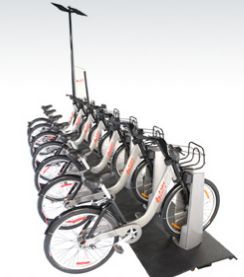And the winner is … BIXI!?!?! Boston has selected a vendor for its pilot bike-share program called the BIXI system coming from Public Bike System out of Montreal. BIXI is now operational in its home city and set to start a program in London. It might be a bit surprising that the Municipal Area Planning Authority did not select BikeNow, a Boston-based company that was created at the time of the RFP but has no current operations. Less surprising may be the contract loss by Veloway, whose parent company Veoila Transportation, runs the city’s MBTA rail.

BIXI has been granted the mandate to set up and operate a BIXI system in central Boston as well as the right to negotiate to expand the system to neighboring municipalities. Central Boston will be served by a network that includes 2,500 bikes, 290 stations and 3,750 docking points, with the potential to expand to a 5,000-bike system. After Boston, Cambridge, Somerville, and Brookline are expected to be rolled out.
Expected to start in 2010, the North End is listed as one of the first target areas to receive bike-share stations, likely near central and parking lot areas. The phase 1 area includes the Financial District, North Station, Government Center, the North End, South Station, Back Bay, the Boston Common and Public Garden, Kenmore Square, the Fenway and the Longwood Medical Area.
Still, there are many obstacles to a successful bike-sharing program in Boston. Most importantly, the city has very limited bike infrastructure in the way of bike lanes. The incidents of car and bike conflicts are increasing in Boston with the ‘sharing’ of our less than perfect roadways. If casual bikers don’t feel safe to ride in Boston, they won’t.
Cost is always an obstacle in getting this type of program to a sustainable level. In other cities, parking tickets subsidize the bike-share program. Estimates are that the capital cost is over $3,000 for each new bike with another $3,000 for annual maintenance.
In Montreal, BIXI is $78 for an annual pass and the first half-hour of each rental is free. After that, it’s $1.50 for the second 30 minutes, $3 for the third, and $6 for subsequent half-hour increments. A day pass for the system costs $5, with the same hourly charges.
Another problem could be vandalism issues as reported in Paris. Other cities, including BIXI’s Montreal have sell-out problems at peak times. Bixi stations are in place from April to November and seasonal availability is likely in Boston too.
The video below shows how the bike-share system works in Barcelona by a similar, but different vendor. In Barcelona, the system is limited to residents because it can’t handle the volume of visitors as well. It is unclear whether the Boston system would be open to just residents or tourists as well.
Related posts:
